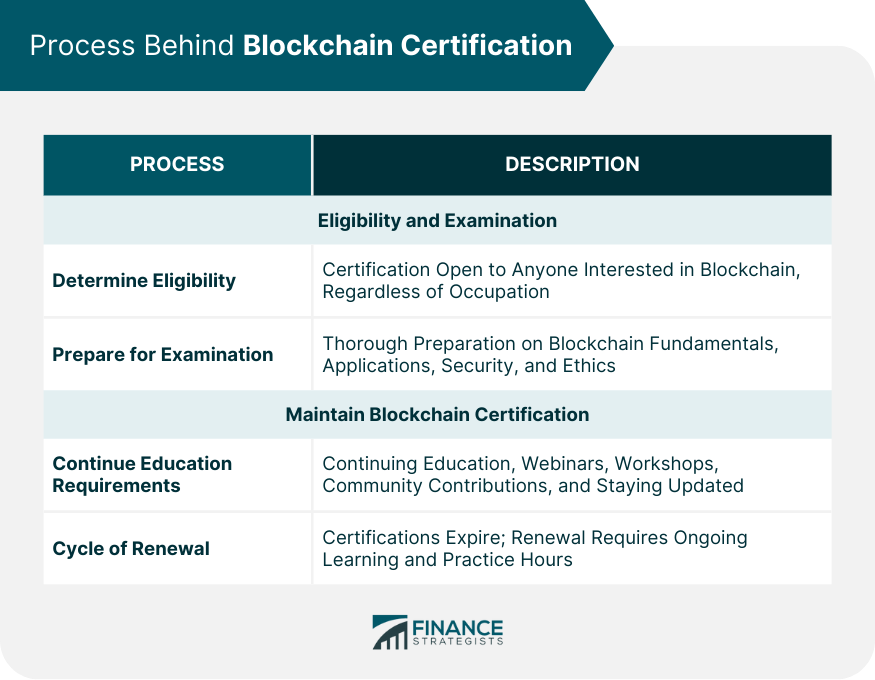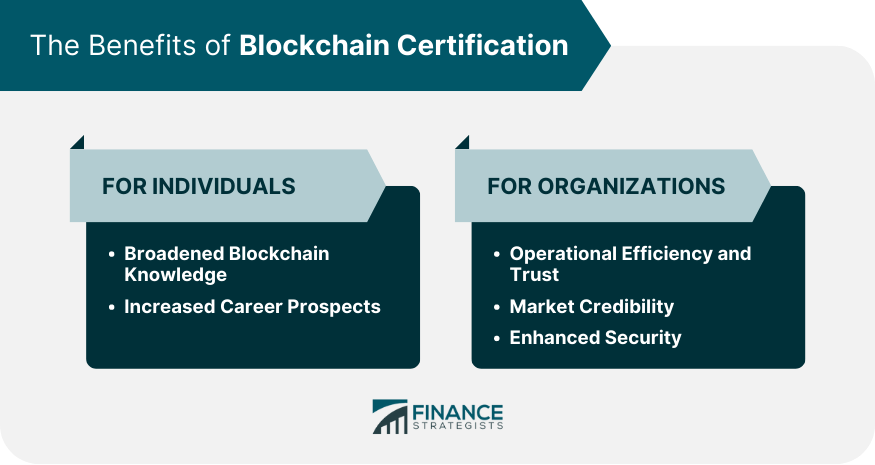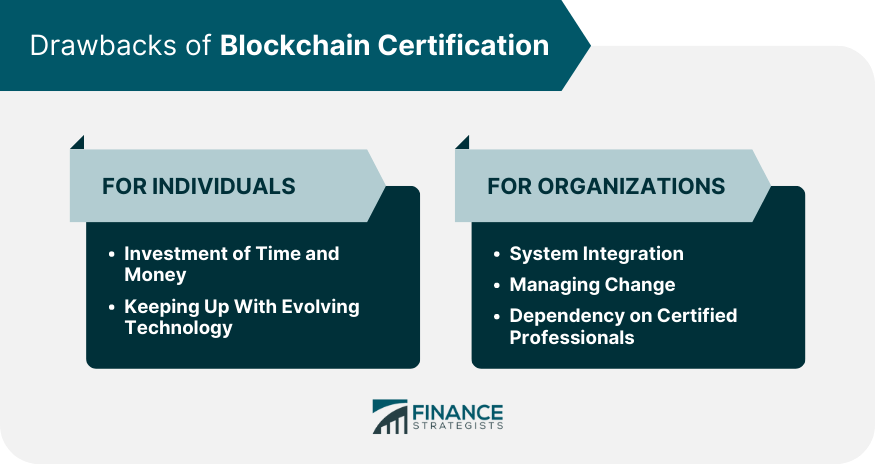Blockchain certification is a formal acknowledgment of an individual's expertise in the blockchain domain. It reflects a comprehensive understanding of blockchain technology and its diverse applications, demonstrated by successfully passing a rigorous examination. This credential showcases proficiency in handling various blockchain tools and platforms, making the certified professional a valuable asset in the tech industry. The purpose of blockchain certification lies in fostering blockchain competency and cultivating a talent pool capable of spearheading blockchain initiatives. It plays a vital role in facilitating blockchain adoption across sectors by equipping professionals with the necessary skills to innovate, educate, and lead blockchain transformations. Thus, blockchain certification is instrumental in shaping a digitally literate workforce, encouraging broader acceptance of this revolutionary technology. Blockchain certification is not restricted to a specific field or occupation. It is open to anyone willing to delve deep into the world of blockchain – be it a student, a software developer, a finance professional, or a business leader. However, eligibility often requires a foundational understanding of blockchain and its principles. The examination for blockchain certification covers a range of topics, including blockchain fundamentals, its applications, security implications, legal and ethical considerations, and potential future developments. Aspirants are expected to prepare thoroughly using a variety of resources, including online courses, textbooks, webinars, and workshops. To maintain the validity of blockchain certification, certified professionals are usually required to engage in continuing education. This could involve attending relevant webinars, participating in workshops, contributing to the blockchain community, or even authoring articles and research papers on the subject. Certifications typically have an expiration date. Renewal processes often involve demonstrating continued learning and a certain number of practice hours. These stringent renewal requirements ensure certified professionals stay updated with the rapidly evolving blockchain landscape. Blockchain certification significantly broadens one's blockchain knowledge and skillset. Certified professionals possess a comprehensive understanding of blockchain technology and are proficient in handling various blockchain platforms and tools. This boosts their competency and makes them valuable assets in the job market. Blockchain certification opens up a wide range of career opportunities. With an ever-growing demand for blockchain expertise, certified professionals can secure high-paying jobs, enjoy greater job security, and even transition into new roles within the blockchain domain. Implementing blockchain solutions can significantly enhance operational efficiency by eliminating intermediaries, reducing costs, and automating processes. A certified professional can successfully manage such implementations, thereby boosting the organization's efficiency. Moreover, employing certified blockchain professionals adds credibility and trust to an organization's blockchain initiatives. Blockchain certification can enhance an organization's market credibility. Certified professionals possess the expertise to effectively implement, optimize, and troubleshoot blockchain solutions, which significantly contributes to an organization's credibility in the highly competitive market. Certified professionals are well-versed in the security features and mechanisms of blockchain, ensuring that data is protected from unauthorized access, manipulation, and fraud. By implementing blockchain solutions, organizations can enhance data security, build trust among stakeholders, and mitigate risks associated with data breaches and cyberattacks. Blockchain certification can be a substantial investment of both time and money. Preparing for certification requires dedicated effort and often costly resources. Given the rigorous nature of the certification process, the investment can be quite significant. The blockchain technology landscape is dynamic and rapidly evolving. Thus, keeping up-to-date post-certification can be challenging. Continuous learning and adaptation are necessary to maintain the value and relevance of the certification. Integrating blockchain technology within existing systems can pose significant challenges for organizations. Certified professionals, although adept with blockchain technology, might face difficulties melding it with established infrastructure, which can hinder the practical implementation of blockchain solutions. As with any significant technological adoption, change management is a significant hurdle. There can be resistance to change, and the lack of understanding of blockchain can lead to apprehension among team members. Certified professionals will need strong leadership and effective communication skills to navigate these challenges. Organizations may become dependent on certified professionals for blockchain-related initiatives and projects. If there is a limited number of certified individuals within the organization, their availability and capacity to handle multiple projects simultaneously may become a bottleneck. It is important to have contingency plans and build a broader pool of blockchain expertise within the organization. Blockchain certification stands as a critical catalyst in fostering a competent workforce well-versed in blockchain technology and its wide-ranging applications. By successfully passing an intense examination, certified professionals exhibit a comprehensive understanding of blockchain fundamentals and hence are deemed valuable assets in any industry. This certification transcends professional boundaries, inviting individuals from diverse fields to delve into blockchain technology. While the process necessitates a substantial investment of time and resources, the rewards are significant, ranging from enhanced personal capabilities to increased career prospects. For organizations, certified professionals bring operational efficiency, trust, and market credibility. Despite the challenges associated with technology integration and change management, the transformative potential of blockchain is well worth the investment. Thus, blockchain certification plays a pivotal role in driving the broader acceptance and adoption of this revolutionary technology.What Is Blockchain Certification?
Process Behind Blockchain Certification
Eligibility and Examination
Determine Eligibility
Prepare for Examination
Maintain Blockchain Certification
Continue Education Requirements
Cycle of Renewal

Benefits of Blockchain Certification
Enhance Personal Capabilities
Broadened Blockchain Knowledge
Increased Career Prospects
Advantages for Organizations
Operational Efficiency and Trust
Market Credibility
Enhanced Security

Drawbacks of Blockchain Certification
Challenges for Individuals
Investment of Time and Money
Keeping Up With Evolving Technology
Hurdles for Organizations
System Integration
Managing Change
Dependency on Certified Professionals

Bottom Line
Blockchain Certification FAQs
Blockchain certification is a recognized validation of an individual's knowledge, skills, and proficiency in the blockchain domain. It involves successfully passing an examination that tests one's understanding of fundamental blockchain concepts and applications.
Blockchain certification is open to anyone willing to delve into the world of blockchain, including students, software developers, finance professionals, and business leaders. However, it often requires a foundational understanding of blockchain and its principles.
Blockchain certification broadens one's blockchain knowledge, increases career prospects, and enhances personal capabilities. For organizations, it improves operational efficiency, boosts market credibility, and facilitates the successful implementation of blockchain solutions.
For individuals, the challenges include a significant investment of time and money and the need to keep up with the rapidly evolving technology. For organizations, challenges include integrating blockchain technology with existing systems and managing changes that come with significant technological adoption.
To maintain the validity of blockchain certification, certified professionals are usually required to engage in continuing education, such as attending webinars or workshops, contributing to the blockchain community, or authoring articles and research papers. The certification typically needs to be renewed periodically, which involves demonstrating continued learning and a certain number of practice hours.
True Tamplin is a published author, public speaker, CEO of UpDigital, and founder of Finance Strategists.
True is a Certified Educator in Personal Finance (CEPF®), author of The Handy Financial Ratios Guide, a member of the Society for Advancing Business Editing and Writing, contributes to his financial education site, Finance Strategists, and has spoken to various financial communities such as the CFA Institute, as well as university students like his Alma mater, Biola University, where he received a bachelor of science in business and data analytics.
To learn more about True, visit his personal website or view his author profiles on Amazon, Nasdaq and Forbes.











